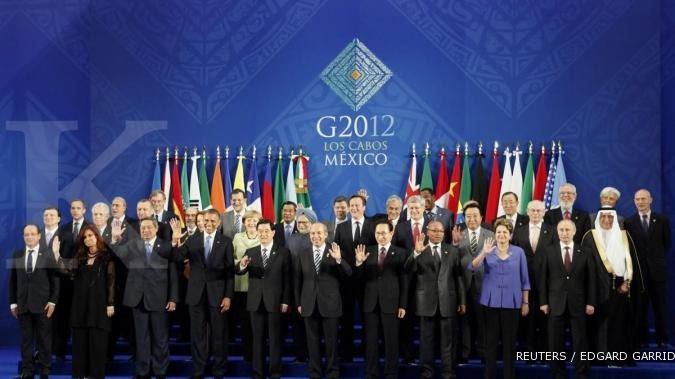JAKARTA. Deriving lessons learned from the experiences of the 1997 Asian financial crisis and the 2008 financial market meltdown, Indonesia has told G20 leaders that demands for austerity measures for economies in distress must not entirely rule out the possibility of economic expansion.
At the first session of the G20 Summit here on Monday, President Susilo Bambang Yudhoyono shared Indonesia’s experience of past crises, in which he said the country muddled through fiscal reforms while at the same time maintaining policy support for its main economic driver: Domestic consumption.
Yudhoyono said that a middle course was possible in the ongoing eurozone debate between those supporting austerity measures and those supporting economic growth. He hoped that policy makers in the region would come up with amicable solutions to speed up economic recovery that had affected the world.
The President’s statement comes with other emerging economies in the G20 grouping throwing their support behind France, which under the leadership of François Hollande has rejected the harsh imposition of austerity measures and favored economic expansion in battling the crisis.
Brazil’s finance minister, Guido Mantega, said that the austerity strategy demanded by Greek creditors was not working. He added that there was a need to reconcile fiscal consolidation with stimuli for growth. On the opposite side of the spectrum, German Chancellor Angela Merkel said that any loosening of Greece’s reform promises, after receiving the ¤130 billion (US$164 billion) bailout, would be unacceptable.
Greece has just completed an election, producing a new political coalition that aims to maintain the country’s membership in the 17-member currency bloc. The parties, however, demanded a renegotiation to austerity measures previously signed with international creditors so as to avoid political backlash from constituents.
Greece is not the only eurozone issue being discussed at the G20, as Spain has become the fourth euro-region nation to seek a bailout, with the global economy in its weakest state since the 2009 recession.
According to a draft communique that is expected to be finalized on Tuesday, the European Union aims to bring about closer integration of the region’s banking system and step closer toward tighter fiscal coordination.
“To some extent there has to be open-mindedness,” said Indonesian Trade Minister Gita Wirjawan.
Gita said that Indonesia’s experience in the Asian financial crisis was a clear example of how draconian fiscal measures could be counterproductive. He said that international lenders should allow bailout recipients some room for economic growth in a bid to achieve faster recovery.
“I hope the IMF and big economies in Europe will consider this approach not to be too drastic or harsh with their demands on bailout recipients. I think there is a necessity to allow countries in crisis to grow,” he said.
Almost in concert with emerging countries, the Obama administration, which is now vying for re-election, suggested that a review on terms and conditions for Greece’s bailout would be possible.
US Under Secretary for International Affairs Lael Brainard told reporters on the sidelines of the summit that economic stabilization programs were designed with some flexibility. She said that there was room for both supporters of austerity and growth to sit down and find a solution. She suggested that Greece could be given more time to implement reforms.
“Basic reforms are going to be important regardless, but there is a time dimension and also a dimension of recognizing that growth has been weaker than anticipated,” Brainard said as quoted by Reuters.
English
/2012/06/20/915463044.jpg)










